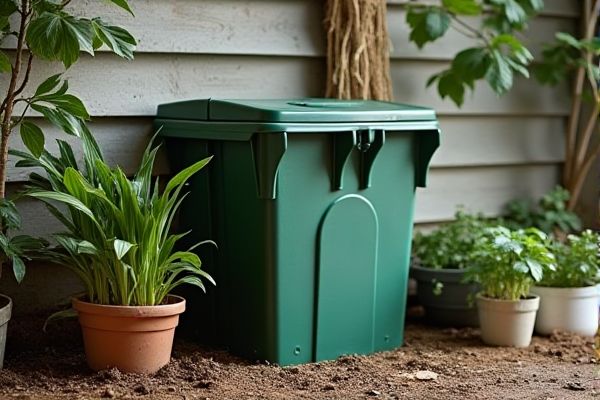
A compact compost bin is ideal for small spaces and quick decomposition, while a large bin offers greater capacity for processing more organic waste efficiently. Explore the full article to find out which compost bin suits your needs and lifestyle best.
Table of Comparison
| Feature | Compact Compost Bin | Large Compost Bin |
|---|---|---|
| Size | Up to 20 gallons | 50 gallons or more |
| Ideal For | Small gardens, apartments | Large gardens, farms |
| Space Requirement | Minimal, fits small spaces | Requires ample outdoor space |
| Composting Speed | Faster due to smaller volume | Slower but higher output |
| Maintenance | Easy, less turning | More effort, regular turning |
| Cost | Affordable, under $50 | Higher, $100 and above |
| Material | Plastic or small metal bins | Heavy-duty plastic, wood, or metal |
| Best For | Kitchen scraps, limited yard waste | Large amounts of garden and yard waste |
Introduction to Compost Bins: Compact vs Large
Compact compost bins offer space-efficient solutions ideal for urban gardens and small households, facilitating faster decomposition due to their manageable size and ease of turning. Large compost bins accommodate greater volumes of organic waste, making them suitable for rural settings or large families, providing extended thermal retention which enhances microbial activity. Choosing between compact and large bins depends on waste volume, available space, and garden needs, impacting compost quality and maturation speed.
Space Requirements: Assessing Your Available Area
Compact compost bins require minimal space, making them ideal for small gardens, balconies, or urban settings where area is limited. Large compost bins need significantly more room, suitable for spacious yards or community gardens that allow for greater organic waste processing. Assessing available area helps determine the best bin size to optimize composting efficiency without overcrowding the space.
Composting Capacity: How Much Can Each Bin Hold?
A compact compost bin typically holds between 5 to 15 gallons, making it ideal for small households or limited outdoor spaces. Large compost bins, on the other hand, can accommodate 50 gallons or more, suitable for heavy composting and larger volumes of organic waste. Choosing the right size ensures your composting capacity aligns with Your waste production and available space.
Ease of Use and Accessibility
Compact compost bins offer greater ease of use due to their manageable size, allowing users to place them conveniently in small spaces such as balconies or kitchens. Large bins provide higher capacity but can be cumbersome to turn and move, often requiring more physical effort and space. Accessibility is enhanced in compact bins because their smaller dimensions facilitate quicker, more frequent access for adding materials and turning the compost.
Speed of Decomposition: Which Bin Works Faster?
Compact compost bins accelerate decomposition by retaining more heat and moisture due to their smaller volume, creating optimal microbial activity conditions. Large bins may take longer to break down organic matter because of decreased temperature regulation and aeration challenges. Faster composting typically occurs in compact bins, especially when managed properly with regular turning and balanced input materials.
Odor and Pest Control Considerations
Compact compost bins minimize odor and pest issues by limiting exposure to air and reducing waste volume, creating an environment less attractive to flies and rodents. Large compost bins, while capable of handling more organic material, require careful aeration and regular turning to prevent unpleasant smells and deter pests effectively. Managing your compost size according to your household waste and maintenance capacity ensures better odor control and pest prevention.
Maintenance and Upkeep Requirements
Compact compost bins require more frequent turning and monitoring to avoid odors and speed up decomposition due to limited airflow and space. Large compost bins offer better aeration and temperature retention, reducing the need for constant maintenance and allowing for slower, more natural breakdown of organic material. The choice between bin sizes depends on the user's available time for upkeep and desired composting speed.
Cost Comparison: Upfront and Long-Term Expenses
Compact compost bins generally have a lower upfront cost, making them an affordable choice for small-scale composting. Large bins require a higher initial investment but often provide better aeration and capacity, which can reduce maintenance expenses and increase compost production efficiency over time. Your long-term expenses will depend on usage frequency and volume, but large bins typically offer greater value for intensive composting projects.
Best Uses: Ideal Scenarios for Each Bin Size
Compact compost bins are best suited for apartment dwellers or small households with limited kitchen waste, offering a space-efficient solution ideal for indoor use. Large compost bins are perfect for homeowners with ample outdoor space and higher volumes of organic waste, enabling faster decomposition and greater capacity for garden scraps. Your choice depends on the volume of waste you generate and the available space for composting.
Environmental Impact and Sustainability Factors
Compact compost bins reduce environmental impact by minimizing space usage and encouraging urban composting, which decreases landfill waste and greenhouse gas emissions. Large bins support higher volume composting that can handle diverse organic materials, promoting sustainable practices through bulk waste recycling and soil enrichment. Your choice depends on available space and composting goals, balancing convenience with environmental benefits for sustainable waste management.
 homyna.com
homyna.com